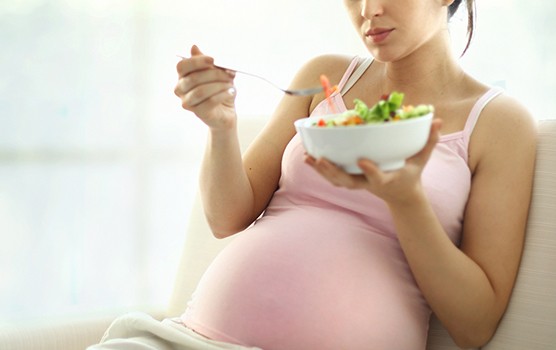Food safety4
As pregnant women are at greater risk of food poisoning, they should practice excellent food safety and avoid alcohol. Here are some foods to avoid
- Foods that may contain listeria bacteria e.g. soft cheese (brie, camembert, ricotta, feta, blue cheese), soft-serve ice cream, raw or smoked seafood, sandwich meats, bean sprouts, pre-prepared salads, and pâté.
- Raw eggs as they may contain salmonella.
- Alcohol – not drinking is the safest option.
- Fish that may contain high levels of mercury – Food Standards Australia New Zealand recommend consuming no more than one serve (100g cooked) per fortnight of shark/flake, marlin, or broadbill/ swordfish, and no other fish that fortnight, OR one serve (100g cooked) per week of orange roughy (deep sea perch) or catfish and no other fish that week. OR 2-3 servings per week of any other fish and seafood
- Foods such as nuts during pregnancy, only if they are allergic to the foods themselves – avoiding these foods has no impact on the infant’s risk of developing allergy symptoms.
The Role of Nutrition in Pregnancy Health
A well-balanced diet can help reduce the risk of:
- Excessive gestational weight gain
- Gestational diabetes
- Gestational hypertension
- Antenatal depression
Physical activity also plays a key role in pregnancy health, offering benefits such as:
- Reduced risk of urinary incontinence
- Better blood sugar control
- Improved sleep quality
- Potential pain relief during labour
By focusing on a nutrient-dense diet and maintaining an active lifestyle, expectant mothers can support both their own health and the healthy development of their baby. If you’re unsure about your dietary choices, consulting a registered dietitian or healthcare provider in Loganholme can help tailor recommendations to your needs.
Call us at 07 3132 0898 for more pregnancy support in Loganholme.
References
- Australian Government Department of Health and Aged Care. (2020, Jul 17). Pregnancy Care Guidelines – Nutrition, Physical Activity and Weight. https://consultations.health.gov.au/health-services-division/review-pregnancy-care-guidelines/ ↩︎
- Marshall, N. E., Abrams, B., Barbour, L. A., Catalano, P., Christian, P., Friedman, J. E., Hay Jr, W. W., Hernandez, T. L., Krebs, N. F., Oken, E., Purnell, J. Q., Roberts, J. M., Soltani, H., Wallace, J., & Thornburg, K. L. (2021, Dec). The importance of nutrition in pregnancy and lactation: lifelong consequences. Am J Obstet Gynecol, 226(5), 607-632. https://pmc.ncbi.nlm.nih.gov/articles/PMC9182711/ ↩︎
- Caut, C., Leach, M., & Steel, A. (2019). Dietary guideline adherence during preconception and pregnancy: A systematic review. Maternal & Child Nutrition, 16(2), e12916. https://pmc.ncbi.nlm.nih.gov/articles/PMC7083492/ ↩︎
- Eat for Health. (n.d.). Healthy Eating during Your Pregnancy. https://www.eatforhealth.gov.au/sites/default/files/files/the_guidelines/n55h_healthy_eating_during_pregnancy.pdf ↩︎
Komniarek, M. A., & Rajan, P. (2016). Nutrition Recommendations in Pregnancy and Lactation. Med Clin North Am, 100(6), 1199-1215. https://pmc.ncbi.nlm.nih.gov/articles/PMC5104202/
Check our Previous Blogs
- Why Movements Matter for hypermobile Ehlers-Danlos Syndrome, and Hypermobility Spectrum Disorder
- Understanding Whiplash: Your First Steps to Recovery
- Runner’s Knee Explained: Causes, Symptoms & 7 Treatments
- Shin Splints No More: 6 Proven Ways to Prevent and Treat the Pain
- Stop Tennis Elbow for Good: 5 Proven Treatments That Work


